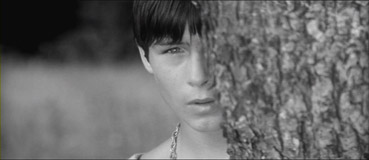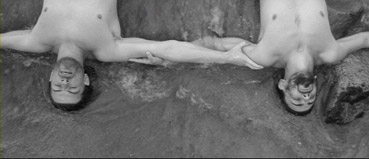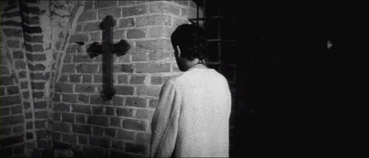"Do not applaud me. It is not I who speaks to you,
but history which speaks through my mouth." |
Fustel de Coulanges |
"Suffering is the way to God." |
Armin |
The representation of the Middle Ages in film tends to fall into two camps. At one end of the spectrum, there's the light, romanticised, and dare I say it, glamorous interpretation, typified by noble knights, even nobler steeds, fair maidens and wisdom-laden magic, engrained into popular culture from Arthurian legend or the many and varied and often verdant evocations of Robin Hood and his Merry Men on screen, arguably hitting its swashbuckling peak with Michael Curtiz's The Adventures of Robin Hood, with Errol Flynn as history's favourite hero-turned-outlaw. If you pass through that charmed depiction, you'll find yourself in the middle, immersed in the comedic farce of Monty Python and the Holy Grail. Now at the other end of the spectrum, you enter the dark, lonely, and austere world full of the diligent and devout. The shining example of this kind of depiction is Ingmar Bergman's Det sjunde inseglet/The Seventh Seal, which masterfully encapsulates all the beauty and brutality such a life naturally engenders.

If you were to rank similar films along that light to dark scale, František Vláčil's Údolí včel/The Valley of the Bees would be perfect company for Bergman's film, and indeed, Ondřej (Petr Čepek), just one of the repressed, tortured souls that belong to to an order of Teutonic knights would find a kindred spirit in Max von Sydenow's chess playing knight. Rather than fighting this darkness, The Valley of the Bees gives into and immerses itself in it, producing a film that's brave, thought-provoking and contentious. Aesthetically, it's breathtaking to look at, and emotionally, it's hard to endure, which makes for an incredibly potent experience.
As a young boy, Ondřej (played by Zdeněk Sedláček for the early part of the film), is inducted into the Order of St Mary of Jerusalem after a rather ferocious altercation with his father Lord of Vlklov (Zdeněk Kryzánek) during a wedding feast, where he's introduced to his new stepmother, child-bride, Lenora (Jana Hájková and then later Věra Galatíková). Fearing his son will die from his injuries, he prays for his soul to be saved, sentencing his son to the confines of monastic life, only saved from isolation by mentor and later friend, Armin (Jan Kačer). As the years pass, Ondřej renounces everything but his faith and his bond with Armin grows, looking to him for guidance. In the wake of an incident at the monastery, Ondřej's faith, always weaker than Armin's is called into question, and he abandons the Order, returning home to Vlklov, with Armin following behind, intent on bringing his friend back into the fold. Out in the wider world once more, Ondřej finds it much changed, and both he and Armin are tested at every turn. When the two men are reunited, Ondřej finds himself with another sacrifice to make, and its price is a hefty one.
Made almost immediately after what's arguably Vláčil's most famous film, Marketa Lazarová, (also available on DVD through Second Run), Bees might, at first glance, feel like companion film of sorts, since they're both set in same era with the same level of meticulous attention to period detail (some of the costumes, props and even actors appear in both productions), but that's not entirely the case. If anything, they're exemplary of a spectrum of another kind: the kind of film Vláčil can make and how different his style can be. Stylistically, while Marketa is free, unbound, and celebrates its Pagan roots in a way that's the filmic equivalent of bawdy Chaucer, Bees is the polar opposite in almost every respect.

Early on, it's abundantly clear that this slice of medieval life is going to be a rather more formal affair. Bees is an incredibly restrained film, with an appropriately frugal approach to what's on screen. Though the juxtapositions of scale, shape and texture (the recurring motifs of sea and stone are particularly striking) Vláčil makes throughout the film are lovely to look at, there's also a real sense that they have a purpose beyond the visual and the artistic. Surprisingly, in light of the fact most of the film takes place outside – particularly the second half where Armin journeys to find Ondřej after he flees – this taut style makes the film feel strangely claustrophobic, rather neatly reflecting the constant internal battle which Ondřej and his fellow brothers fight on a daily basis as they try, valiantly, to adhere to the strict moral code of the Order, whilst suppressing their own desires. In fact, there are times when the pressure they're under seems so unbearable, you're left wanting to step inside and take some of the weight off their backs, just to bring some relief.
This is not a film that treats its audience lightly. Even the love stories presented here come with the baggage of taboo, in the shape of adult Ondřej falling in love with his stepmother Lenora, and the unspoken homoerotic subtext between he and Armin, which drive both men to do extraordinary things for the ones they love. Given the context of its making – very much under the shadow and the confines of the hammer and sickle – Vláčil's film is a brave one, and the triptych of silhouetted figures on the DVD cover don't give the slightest indication of what's to come. And, like the members of the brotherhood we meet along the way, there's much more to them than their crucifixes and chain mail implies.
Released just before the Soviet invasion of Czechoslovakia in 1968, the film was read as an attack on Communist values and banned by the authorities, thinking that Ondřej's struggle after being forced into a hierarchical and puritanical order against his will was a subversive one. In the wake of those turbulent years, this film as lost none of its potency, and of course, if you look toward the film with a political agenda you'll undoubtedly find those themes. Just like the comparisons to the classical art house cinema of Eisenstein, Bergman, Kirosawa and Bresson are easy to draw and even easier to see, to burden Bees with such weighty labels is and political readings, in all honesty, rather unfair, since obviously more than capable of standing up and speaking for itself. This film is by no means your classic Middle Ages fable, and is most definitely a nightmare rather than fairytale, since the dragons Ondřej and those around him must face are far more fearsome than the one St. George ever had to slay.
A rather lovely 2.35:1 anamorphic transfer from a carefully restored print that sings a small hymn to the tonal beauty of Frantisek Uldrich's fabulous monochrome scope cinematography. Detail is crisp (you can almost feel the metal of the chain mail), the contrast is close to perfect, with black solidity achieved without sacrificing picture information, and there's hardly a blemish to be seen throughout.

The clear mono 2.0 soundtrack has some limitations in dynamic range common to films of this vintage and some very slight distortion on louder sounds, but otherwise there are no issues here and like the print it is damage free.
In addition to the wonderfully restored print, which comes complete with Czech diacritics on the subtitles (a very nice touch), the release is accompanied by an illustrated booklet, which is almost entirely given over to an essay (aside from the production and DVD credits) by Peter Hames. For those of you who are Second Run's aficionados, Hames will already be familiar to you for his essay on Věra Chytilová's Daisies, and his writing here is equally as impressive, and certainly makes up for the lack of other supplemental features. Through and detailed, without being too dry, Hames surveys Vláčil's career right from his early documentary films for the Czech Army Film Unit through to 1969's Adelheid and beyond, putting the various films in the spotlight and under the microscope. I especially enjoyed the coverage given to Marketa Lazarová, and the commonalties between it and The Valley of the Bees. A great read if you're familiar with Vláčil or coming across the director for the first time.
The Valley of the Bees is an incredibly beautiful, immensely powerful and complex film. Philosophical and haunting, it grows evermore richer with subsequent viewings. To describe František Vláčil as a visionary is neither a stretch nor a cliché. Clearly a director of great skill, this film is both a great introduction to and a showcase for those talents. Existing fans of Vláčil's work will need little persuasion to make a purchase. Another high quality release from Second Run, which comes highly recommended.
|